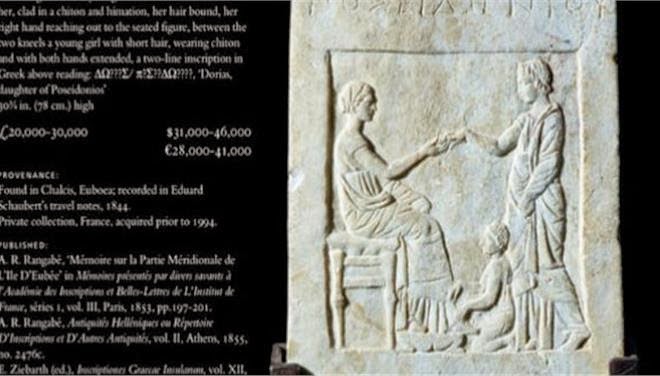
Dr Tsirogiannis [Credit: Christies]
Eight rare antiquities have been pulled from auction by Christie’s over the past six months after a University of Glasgow academic uncovered images of them in archives seized from Italian art dealers convicted of trafficking offences.
The latest tranche of treasures were due to be sold at auction in London tomorrow, but after Dr Christos Tsirogiannis notified Interpol and Italian authorities, they were removed. Last night, the auction house vowed to work with Scotland Yard to scrutinise the items’ provenance.
Dr Tsirogiannis, a research assistant at the university’s Scottish Centre for Crime and Justice Research, discovered the four lots catalogued in the confiscated archives of Giancomo Medici and Gianfranco Becchina, and warned Christie’s was failing to carry out “due diligence”.
Medici was sentenced to ten years in prison in 2004 by a Rome court after he was found guilty of conspiracy to traffic in antiquities. Becchina, a Sicilian antiquities dealer, was convicted in Rome four years ago of trafficking in plundered artefacts.
Dr Tsirogiannis, a forensic archaeologist, has access to their photos and documents via Greek police and prosecutors.
The items accepted for tomorrow’s antiquities sale date back to 540BC. They include an Attic black-figured amphora and an Etruscan terracotta antefix. Cumulatively, they are worth close to £100,000.

this marble grave stele dating from the fourth century BC [Credit: Christies]
It is the second time in six months Dr Tsirogiannis has highlighted the dubiety of items being sold through Christie’s. The value of the eight withdrawn lots exceeds £1.2 million.
Dr Tsirogiannis, a member of Trafficking Culture, a Glasgow-based research programme which compiles evidence of the contemporary global trade in looted cultural objects, said: “Christie’s continues to include in its sales antiquities depicted in confiscated archives of convicted art dealers. Sometimes they sell the lots but nearly every time they withdraw them.
“I don’t understand why they can’t do due diligence beforehand. Clearly, it’s not taking place. Christie’s say they don’t have access to these archives which is not true. Every auction house, dealer and museum should refer to Italian and Greek authorities, who would check for free before the sales.” Dr Donna Yates, of Trafficking Culture, added: “Do they contact antiquities trafficking experts before their auctions? No, never. Do they make public whatever provenance documents they have for a particular piece? No, never. I can only conclude that they don’t take this particularly seriously.”
A spokeswoman for Christie’s said: “We have withdrawn four lots from our upcoming antiquities sale as it was brought to our attention that there is a question mark over their provenance, namely, that they are similar to items recorded in the Medici and Becchina archives.
“We will now work with Scotland Yard’s art and antiques unit to discover whether or not there is a basis for concerns expressed over the provenance.”
She said Christie’s would never sell any item it has reason to believe was stolen and called on those with access to the Medici and Becchina archives to make them “freely available.”
Author: Martyn McLaughlin | Source: The Scotsman [April 13, 2015]